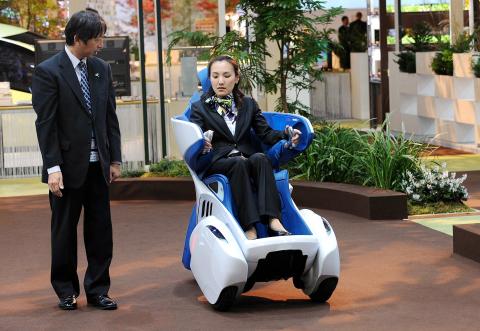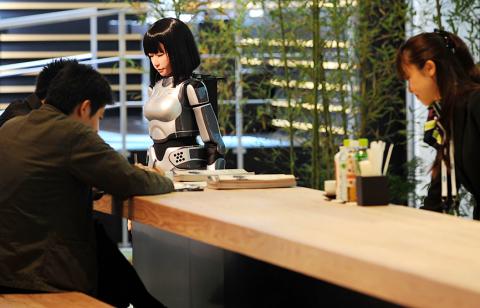While hosting an Asia-Pacific summit, Japan is showing off robots, green cars and space probes to prove its high-tech credentials despite slow growth and threats to crucial rare earth supplies.
Visitors to the “Japan Experience — Ideas Into Reality,” an exhibition on the sidelines of the APEC summit, are greeted by a robot modeled on a young woman, the Cybernetic Human HRP-4C Miim.
“Welcome to the Japan Experience,” the 158cm tall humanoid says.

Photo: AFP
“This exhibition shows Japan’s strengths,” she adds in a halting voice — moving as if to flex her muscles for emphasis — “and attractions. Please see, touch and feel advanced technologies and innovations of Japan.”
The show, which has been put on for leaders, ministers and officials, also features a robot that can ride a unicycle, the wearable power-enhancing Cyberdyne robo-suit and a fluffy robotic baby seal that comforts elderly hospital patients.
Other tech marvels include a plug-in hybrid car to help save the planet, a robo-submarine to explore its ocean depths and a replica of the asteroid explorer Hayabusa that just returned from a seven-year deep space voyage.

Photo: AFP
Other innovations include an indoor vegetable farm for city use that employs solar-powered LED lights, Japan’s next-generation supercomputer, a landmine clearance robot, 3D televisions and images of Shinkansen and maglev trains.
Japan is eager to show that — despite two decades of stagnant growth, a fast-graying population and stiff competition from industrial rivals China and South Korea — it still has what it takes to be a global high-tech leader.
But many worry that the export giant peaked in the early 1990s and is losing its innovative edge and economic heft, a perception reinforced this week as South Korea spares no expense to host a lavish G20 summit.
A more immediate fear is that Japan is being starved of key mineral ingredients used in many of the products on show — rare earth metals that are essential for goods like electric car batteries, flat-screen TVs and missiles.
China, which produces more than 95 percent of rare earths, has choked off exports to Japan since September, traders say, amid the worst diplomatic spat between the Asian giants in years, sparked by a territorial dispute.
“I hope everyone will share rare earth minerals in a friendly manner,” said Toyota Motor official Makoto Morita as he showed off the automaker’s i-Real personal mobility device, which he said couldn’t be made without the commodities.
“Rare earth minerals are used in lithium batteries and in the motors,” he said, pointing at the quietly humming electric three-wheeler that allows people to zip around in a standing position, without carbon emissions.
Morita said rare earth supplies need to be shared, to make environmental technology that will be of global benefit.
“If a majority of people, including the Chinese, don’t use these energy efficient devices, the environment won’t improve very much,” he said.
Meanwhile, Dowa Eco-Systems showed off another innovation that it started years ago, but which has drawn more attention in recent weeks, as Japan’s tech sector has stared at the threat of running out of rare earths.
The firm has found a way to extract 19 metal elements as “e-scraps” from the millions of cellphones, PCs, handheld gizmos and electronic devices that Japanese throw away every year. It calls the recycling system “urban mining.”

South Korea’s equity benchmark yesterday crossed a new milestone just a month after surpassing the once-unthinkable 5,000 mark as surging global memory demand powers the country’s biggest chipmakers. The KOSPI advanced as much as 2.6 percent to a record 6,123, with Samsung Electronics Co and SK Hynix Inc each gaining more than 2 percent. With the benchmark now up 45 percent this year, South Korea’s stock market capitalization has also moved past France’s, following last month’s overtaking of Germany’s. Long overlooked by foreign funds, despite being undervalued, South Korean stocks have now emerged as clear winners in the global market. The so-called “artificial intelligence

CONFUSION: Taiwan, Japan and other big exporters are cautiously monitoring the situation, while analysts said more Trump responses ate likely after his loss in court US trading partners in Asia started weighing fresh uncertainties yesterday after President Donald Trump vowed to impose a new tariff on imports, hours after the Supreme Court struck down many of the sweeping levies he used to launch a global trade war. The court’s ruling invalidated a number of tariffs that the Trump administration had imposed on Asian export powerhouses from China and South Korea to Japan and Taiwan, the world’s largest chip maker and a key player in tech supply chains. Within hours, Trump said he would impose a new 10 percent duty on US imports from all countries starting on

Chinese artificial intelligence (AI) start-up DeepSeek’s (深度求索) latest AI model, set to be released as soon as next week, was trained on Nvidia Corp’s most advanced AI chip, the Blackwell, a senior official of US President Donald Trump’s administration said on Monday, in what could represent a violation of US export controls. The US believes DeepSeek will remove the technical indicators that might reveal its use of American AI chips, the official said, adding that the Blackwells are likely clustered at its data center in Inner Mongolia, an autonomous region of China. The person declined to say how the US government received

Like many of us who are mindful of our plastic consumption, Beth Gardiner would take her own bags to the supermarket and be annoyed whenever she forgot to do so. Out without her refillable bottle, she would avoid buying bottled water. “Here I am, in my own little life, worrying about that and trying to use less plastic,” she says. Then she read an article in this newspaper, just over eight years ago, and discovered that fossil fuel companies had plowed more than US$180 billion into plastic plants in the US since 2010. “It was a kick in the teeth,” Gardiner